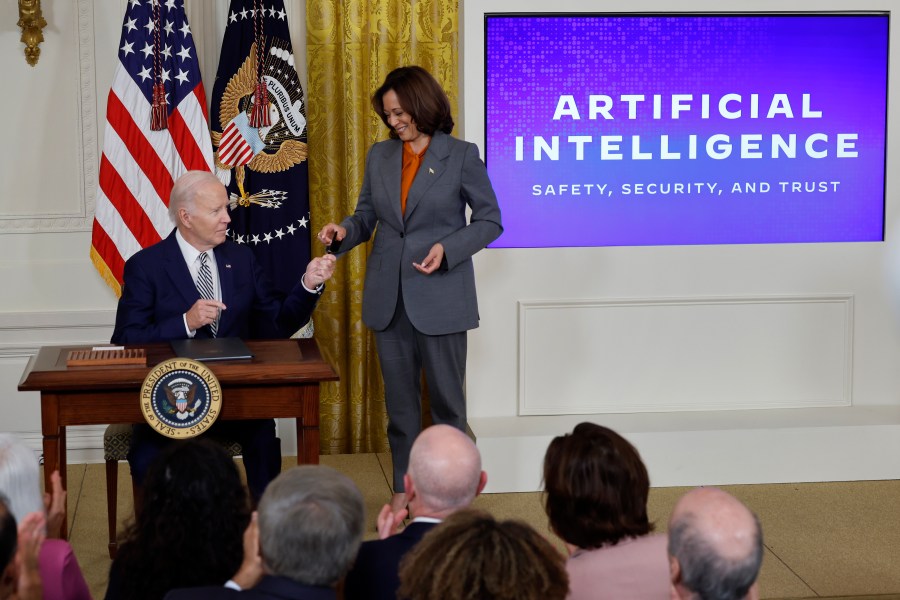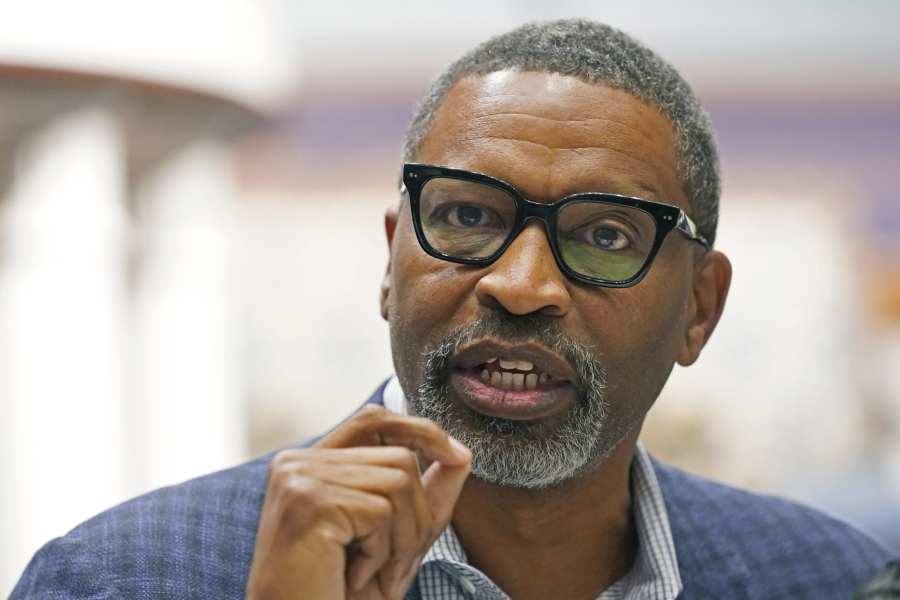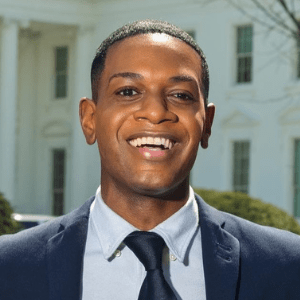Loading the player…
In a sweeping first-ever presidential executive order on AI, President Joe Biden and his administration are aiming to tackle various intersections of race and artificial intelligence.
Though AI is already and will continue to impact the daily lives of Americans, both good and bad, for Black people, data already shows advancing AI technology can create and perpetuate racial discrimination and disparities in myriad ways. Those areas range from housing and health care to the criminal justice system.
In his historic executive order, President Biden seeks to advance equity and civil rights by directing federal agencies to establish clear guidelines and provide support to protect Black and brown communities.

During a White House signing ceremony in the East Room on Monday, Vice President Kamala Harris, who convened civil rights leaders on concerns about AI technology in July, said the U.S. has a “moral, ethical, and societal duty” to make sure it is “adopted and advanced in a way that protects the public from potential harm and ensures that everyone is able to enjoy its benefits.”
Echoing those concerns, President Biden said, “Without the right safeguards in place, AI can lead to discrimination, bias, and other abuses.”
The EO addresses three specific areas in equity and civil rights: housing, algorithmic discrimination, and fairness in the criminal justice system.
For the housing market, Biden orders federal agencies to provide clear guidance to landlords, federal benefits programs, and federal contractors to “keep AI algorithms from being used to exacerbate discrimination.”
The president also seeks to ensure fairness throughout the U.S. criminal justice system. It calls on officials to develop best practices for the use of AI technology in various aspects of the justice system, from sentencing and parole to surveillance and forensic analysis.
The new order also expands beyond Biden’s Blueprint for an AI Bill of Rights to address algorithmic discrimination. The Department of Justice is tasked with working with federal civil rights offices to establish “best practices” for investigating and prosecuting AI-related civil rights violations. Agencies will also work on training and technical assistance.
Dr. Arati Prabhakar, director of the White House Office on Science and Technology Policy, told theGrio President Biden’s “commitment” to civil rights and equity has been “evident from the very first steps that he’s taken.”
She said the administration has worked to “keep up” with AI technology as it advances and, through the executive actions taken so far, has worked to get “ahead of it.”
The White House’s AI bill of rights and new executive order are the “values that guide everything that we do in AI,” said Prabhakar. She added, “Freedom from discrimination was absolutely central to that.”
In a statement provided to theGrio, NAACP President Derrick Johnson applauded the Biden-Harris administration for “taking the proactive steps necessary to make equitable outcomes a reality amidst the growing utilization of artificial intelligence.”

He continued, “Now, we must ensure that these safeguards are put in place and are applicable to all issues top of mind for Black America, especially voting rights. This is what leadership looks like.”
Though Black Americans are historically distrustful of governments and systems, tech policy expert A. Prince Albert III told theGrio that President Biden’s executive order helps “win the trust of African Americans who are wary of technologies and these intrusions into our cultural spheres of influence.”
However, he stressed, “Skepticism toward these technologies is actually what we need.”
Albert, president and CEO of the social entrepreneurship consulting firm Goldwater Ventures, continued, “It’s when we start believing the answers to AI totally, when we start seeing it as the answer to our problems and not a tool to get things done.”
The tech policy leader said he would also like to see further areas of AI technology addressed as it relates to discrimination and protecting Black Americans, including elections.
“We don’t know the truth from not the truth…it becomes so rancorous, so noiseful, and so disturbing,” said Albert.
He is calling for legislation that would enact legally enforceable actions to make sure that candidates, sponsors, and super PACs disclose AI materials and that said materials are checked and verified to avoid disenfranchising and misinforming Black communities.
Albert said there should also be a focus on the ways AI in advertising can be used to dupe Black consumers.
“Think about buying something that you thought did one thing because the commercial said it did, but it doesn’t…it is a means of extorting communities, economically draining communities,” he told theGrio. “Especially people when they’re just trying to make ends meet in an upside-down economic market.”
Albert added, “That is very pernicious, but often overlooked.”
He said employment algorithms are also going to be important to regulate to protect Black workers.
“We are not at the heads of companies. We are not at the top necessarily making all the decisions about who enters the company and who doesn’t,” Albert explained.
The next step for the Biden-Harris administration will be implementing the president’s executive order.
“People have been working even ahead of executive order knowing that it was coming,” Dr. Prabhakar told thGrio. “President Biden has been completely clear from the beginning that we’ve got to get AI right for the American people.
“He’s taking every action he can as president under existing law. It’s broad. It’s comprehensive. It’s cohesive,” she added, “and I’m very optimistic that we’re going to make great progress.”

Gerren Keith Gaynor is a White House Correspondent and the Managing Editor of Politics at theGrio. He is based in Washington, D.C.
TheGrio is FREE on your TV via Apple TV, Amazon Fire, Roku, and Android TV. Please download theGrio mobile apps today!
This post was originally published on this site be sure to check out more of their content.








